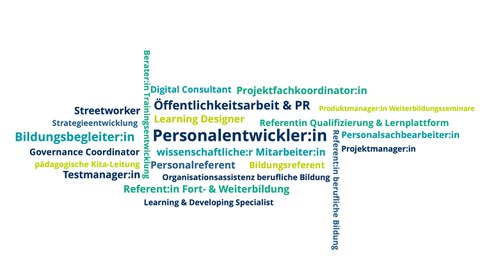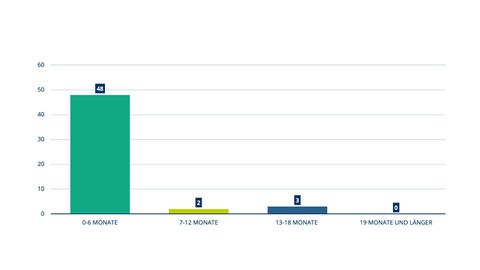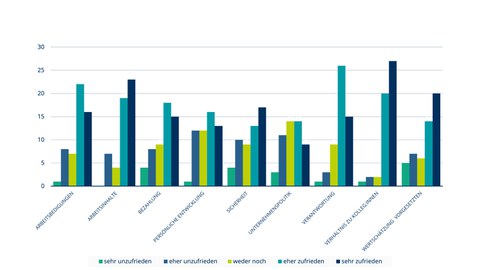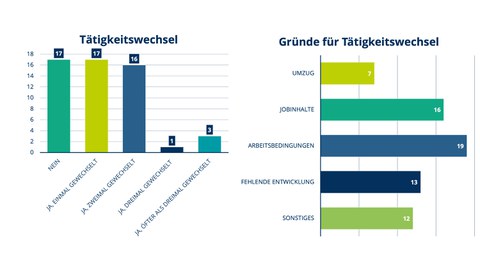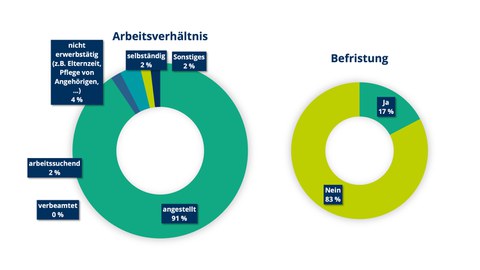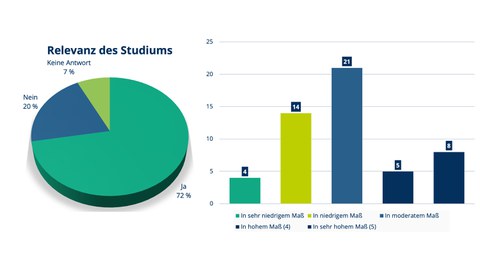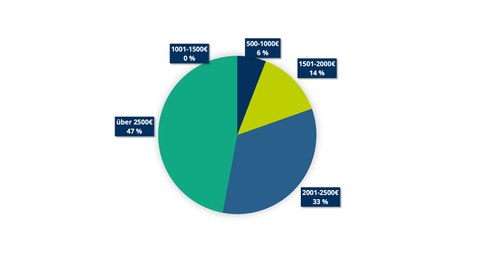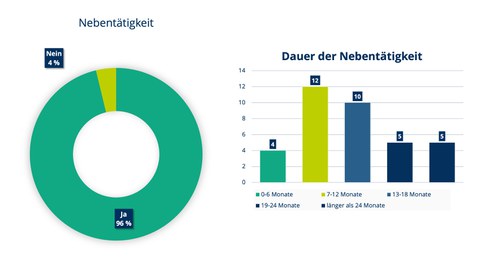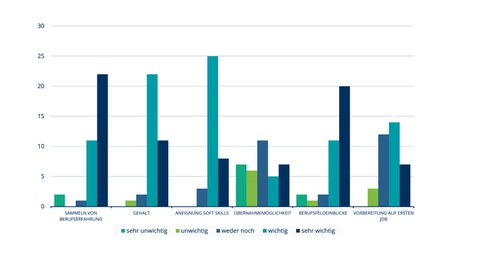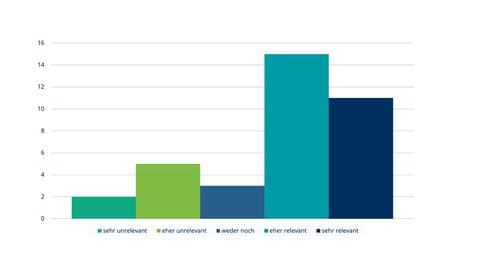Alumni Survey 2023
Table of contents
General information on the 2023 alumni survey
In spring 2023, students Linda Bursch, Antonia Freesemann, Sabrina Hänsel and Paola Schreieck conducted the third alumni survey as part of the research project. Thank you very much!!!
The survey had two main focuses:
- Professional development of graduates after completing the Master's program with a focus on job satisfaction
- Influence of relevant part-time work during the course of study
Below you will find a brief overview of the key results. A more detailed insight can be found in the presentation Alumni Survey 2023
Information on the first job after graduation
- Question: What was the title of your first job after completing your Master's degree in WBF/OE?
- Result : Graduates are versatile as a result of their studies and are employed in a variety of industries.
- Question: How much time passed before you started your first job after completing your Master's degree in WBF/OE? (n=53)
- Result: 90% of all graduates found employment within the first 6 months after graduation. At the latest 1.5 years after graduation, every graduate has taken up employment. This shows that The degree program is well placed on the job market and, for the most part, quickly employable.
- Question: How satisfied were you in general with your subsequent employment? (n=54)
- Results: Overall, alumni are very satisfied with their subsequent employment. Looking at the individual factors (see following slide), alumni are particularly satisfied with the relationship with colleagues and the work content.
-
Question: Have you already changed your job since completing your Master's degree? (n=54)
-
Result: Around 2/3 of respondents have changed jobs once or several times since completing their Master's degree. The main reasons for this were job-related characteristics such as working conditions and job content. However, this also shows that the alumni quickly find a new job and are in demand on the job market.
Information on current professional activity
- Question: What is your employment relationship in your current job? (n=53) Do you have a temporary employment relationship in your current job? (n=52)
- Result: The majority of alumni are employed in their current job. A small proportion are self-employed or not employed for personal reasons (e.g. parental leave). Only 2% of the alumni surveyed are currently looking for work. 83 % of all alumni are currently employed on a permanent basis.
- Question: Did you acquire skills during your studies that are relevant to your current job? (n=54) To what extent do you use the skills you acquired during your Master's degree in your job? (n=39)
- Result: The vast majority consider the skills acquired during their studies to be relevant to their job. People who do not see any relevance work in areas outside their field of study. The degree of relevance of the skills acquired varies, but is predominantly moderate to (very) high.
- Question: How much salary do you receive NET per month in your current job? (n=51)
- Results: 80% of WBF/OE alumni earn €2,000 or more, 47% even earn over €2,500. This means that alumni earn above average compared to other alumni with an educational science degree.
Secondary employment during studies
- Question: Did you work part-time (at least temporarily) during your Master's degree? (n=53)
- Result: The vast majority had a part-time job during their studies. Of these, more than 2/3 stated that this was related to their degree course. The results show that WBF/OE students have a high level of practical relevance due to relevant part-time jobs, among other things. In addition, a good compatibility of studies and part-time job is evident at the WBF/OE.
-
Question: How important were the following aspects to you when choosing a part-time job?
Gaining professional experience, salary, acquiring soft skills, opportunities to be taken on, gaining an insight into a professional field, preparation for your first job
-
Result: Above all, the acquisition of skills and gaining professional experience are cited as selection aspects. The salary to finance the studies also played an important role. Overall, however, professional development dominated.
-
Question: In retrospect, how relevant do you consider your part-time job to be for your professional career? (n=36)
-
Result : The alumni predominantly rate their part-time student job as relevant for their own professional career. This shows that, retrospectively, the opportunity to combine their studies with a relevant part-time job plays an important role in their personal development.

